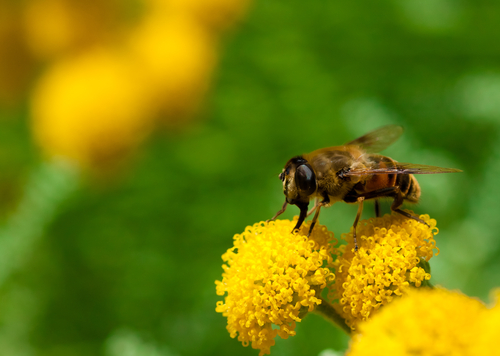The Backyard Insect That’s Causing More of a Bite Than Snakes and Spiders
The backyard is usually a safe place for children to explore and play, but sometimes children have to share their play area with a host of dangerous creatures like snakes and spiders. While many warnings are often shared about these critters being out and about during the heat, there is another creature that can be deadly to your child.
The humble bee.
In the last 13 years, one third of the 42,000 people hospitalized from venomous bites and stings were a result of bee stings.
A study, conducted by The University of Melbourne has found bees are the biggest threat when it comes to bites and stings as they have caused the most hospitalisations and deaths.
The number of hospitalisations due to bee stings is double that of snake bites.
Dr Ronelle Welton, University of Melbourne public health expert at the Australian venom unit, believes this is because people don’t take a bee sting as seriously as that of a snake bite. Research has also found people are developing an allergic reaction to bees after being stung once and since they haven’t had a reaction from the first bite, it’s assumed they won’t develop an allergy to the next one. But this thinking is incorrect.
Just recently a Victorian man Stephen Smith suffered a severe allergic reaction to four bee stings on his leg.
The Herald Sun reported his wife was a bee keeper and there were 40,000 of the buzzing insects next to his house. After he walked past and got stung, he felt faint and his heart beated faster, 15 minutes after receiving the bites.
His son rang Mr Smith’s wife and an ambulance arrived within 10 minutes. When the paramedics arrived, Mr Smith was unconscious and had no blood pressure. He required the equivalent of 5 epipens and surgery.
Mr Smith had never had a problem being stung before as a child and had developed an allergy at the age of 48.
Children can be most vulnerable as they like to play outside. Ants, hornets and wasps can also be a threat to young children.
The Royal Children’s Hospital in Melbourne advises children can develop a severe reaction to insect bites called anaphylaxis. This condition is deemed a medical emergency and requires treatment early.
The signs and symptoms of whether your child has been bitten by an insect can include any of the following:
- A minor skin reaction of painful, itchy welt where the insect has bitten or stung. You may be able to manage this symptom without seeing a doctor. Wash the bite area, add calamine lotion to stop the itching and apply an ice pack to keep the pain and swelling down. An antihistamine like Phenergan or Zyrtec can be given, but check with your local chemist on the quantities.
- The bite mark may swell and the redness can be larger than five centimetres across. Add a cool washer or ice-pack to keep the swelling down.
- Symptoms of a severe allergic reaction include hives, itching, stomach cramps, coughing, wheezing, difficulty breathing and swallowing, choking and fainting. Seek medical attention immediately if these symptoms arise.
- Swelling of the lips or tongue, or difficulty in breathing are signs your child has anaphylaxis and must seek immediate medical help.
When a child has been bitten by a bee, carefully scrape the sting out. Don’t pinch and pull the sting out as this will cause more poison to be injected.
Medical attention should be sought if:
- Your child gets hives or has breathing problems.
- The child is in a lot of pain and won’t settle after a few hours.
When in doubt, seek medical advice.
If your child has experienced a bad reaction in the past, your GP may suggest having an oral steroid drug such as prednisolone, or a self-injection kit called an Epipen on hand. Anyone who cares for your child should know how to give the medicine if the child is bitten or stung. It’s also important for your child to have this medication with them when they go out in case of being bitten.
If you have any questions or concerns regarding bee stings, ask your local GP.










